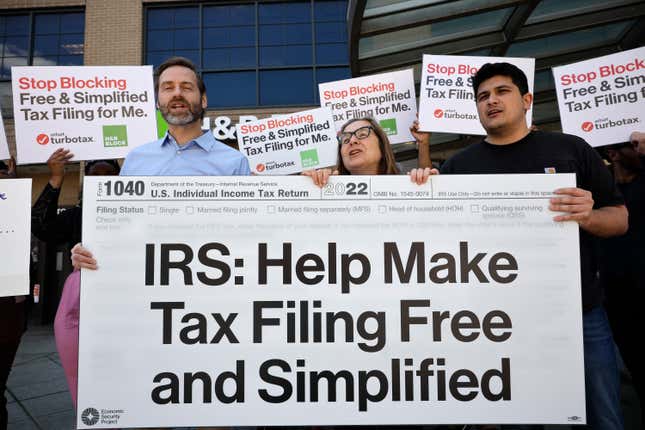
If there’s one thing that all Americans — divided they may be — can agree on, it’s that taxes are a pain. Centuries of that philosophy is what’s employed many of the more than 1.65 million accountants and auditors in the U.S. and allowed services like TurboTax and H&R Block to flourish — despite their exhaustively documented history of problems.
But that might be changing. In spite of years of lobbying from Intuit, the maker of Turbo Tax, and H&R Block, the U.S. Internal Revenue Service (IRS) launched a free Direct File pilot program in 12 states — and it looks to have been a success.
More than 140,800 taxpayers across states like California, Texas, Florida, and New York filed their taxes directly with the IRS this past tax season, claiming more than $90 million in tax refunds and reporting $35 million in tax balances due. The service also attracted a fair amount of attention — more than 3.3 million people checked to see if they’d be eligible, far exceeding the IRS’ expectations although below the 19 million eligible U.S. taxpayers.
Direct File, unlike the IRS’ Free File, isn’t subject to income limits. It’s also based entirely on new software built by the IRS. Many states have free filing options, but they’re based on systems designed and licensed by private companies
Though its future is not set in stone, 90% of the 11,000 Direct File users surveyed ranked their experience with the program as “excellent” or “above average,” according to the IRS. Many also said their perception of the IRS as an agency was boosted.
“From the very beginning of the Direct File pilot, we wanted to test new ways to give taxpayers an easy, accurate and free way to file their taxes online directly with the IRS,” Commissioner Danny Werfel said in a statement Friday. “We saw a strong response from the pilot, and Direct File’s users generally found it fast and easy to use.”
What it means for Big Tax Prep
That’s all well and good for the IRS, which really could use some love, but what does it mean for tax-prep companies?
Although the IRS’ system isn’t equipped with all the features of Turbo Tax and H&R Block, those firms still seem poised to lose some customers. The IRS last May found that three-quarters of Americans would be interested in a free tax-filing system provided by the government.
The left-wing non-profit Economic Security Project estimates that a scaled-up version of Direct File could save taxpayers $160 each year on average in tax prep costs. Low-income households could also gain up to $12 billion in unclaimed federal tax credits, the advocacy group says.
There are also good reasons for consumers to be wary of some tax prep companies.
The New York State Department of Financial Services in July 2020 found that both Intuit and H&R Block — among other tax prep companies — engaged in “unfair and abusive practices” to push consumers toward paid products, even when eligible for free filing. More than 14 million Americans paid tax prep companies a total of about $1 billion in 2019 for services they should have received for free, according to an audit from the Treasury Inspector General for Tax Administration.
The U.S. Federal Trade Commission (FTC) in February went after H&R Block for allegedly deceptively marketing its tax-filing software as free to customers who don’t qualify and pushed paid products that they don’t need. The firm also makes it difficult to downgrade from a paid plan to a free plan, the FTC wrote in its complaint.
Just a month earlier, the FTC barred Intuit from advertising its services as “free” and said the company had engaged in deceptive practices. In May 2022, Intuit paid $141 million to settle claims across all 50 states and Washington, D.C. that it tricked millions of customers into buying products deceptively marketed as free.
Plus, it appears that both Intuit and H&R Block have accidentally made tax filing more confusing through shoddy artificial intelligence helpers. AI chatbots used by both companies to answer questions and help people understand their returns have given awful advice, The Washington Post reported last month.
The argument against the IRS’ system, tax prep companies say, is that the IRS and state revenue departments may abuse the system and charge Americans more than they should be. They also note that there are already ways to file your taxes for free right now, such as through a nonprofit.
“Filing taxes without someone advocating for your highest refund could be a recipe for overpaying the Internal Revenue Service and [state] departments of revenue, organizations with titles that clearly state their focus, generating revenue for the government,” Rick Heineman, an Intuit spokesperson, told The Atlantic last month.
What comes next?
All in all, the IRS spent $24.6 million on the various costs associated with starting the Direct File program. Just $2.4 million went to operating costs, including customer service, cloud computing, and user authentication.
With tax season finished, the IRS says it will now review the results of the program and determine whether it merits expansion or termination.
“We will be reviewing the results of the pilot and gathering feedback to help us determine our future course involving Direct File,” Werfel said Friday. “We anticipate making an announcement about future plans later this spring.”
Correction: An earlier version of this article misstated the costs associated with starting the Direct File program. The IRS spent $24.6 million, not $24.6 billion.